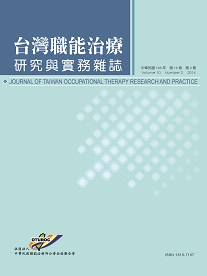Journal of Taiwan Occupational Therapy Research and Practice

半年刊,正常發行
目的:了解本國職能治療實習生之實習壓力來源、實習壓力因應策略的使用狀況、人格特質與實習壓力源,及人格特質與因應策略之相關。期盼做為職能治療學生、實習生、學校及臨床實習單位的參考,並建議適當教學方式,以提升實習成效。方法:收案對象為77名職能治療實習生。藉由『賴式人格測驗』、『實習壓力量表』與『壓力策略因應量表』三種問卷方式進行研究,探討實習生之人格特質、壓力來源,以及壓力因應策略。結果:研究結果指出職能治療實習生的人格有情緒穩定、心理健康、社會適應良好的特質,但卻不特定集中於內向性格或外向性格。而最常發生的壓力源是『專業知識與技能壓力』,其次是『實際治療個案』與『作業及工作量』。在面臨壓力的因應策略方式較常使用『尋求社會支持』、『問題導向』等方式。部分人格特質與某些壓力源有統計學上的相關性。個性外向者傾向使用問題導向之因應策略。而情緒穩定度不佳的職能治療實習生傾向使用自我責備、責備他人及逃避等因應策略。主觀及攻擊性強者,傾向用責備他人的因應方式。結論:本研究結果支持多樣性臨床教學之必要性。臨床教學上將人格特質列入教學時的考量,可能可以提升實習成效。
Objective: The purposes of this study were to investigate the stressors in fieldwork, the coping strategies, the relationship between students' personality traits and stress, and the relationship between personality traits and coping strategies, in order to provide useful information such as proper teaching technique to therapists to elevate the effectiveness and quality of clinical education. Methods: Seventy seven occupational therapy (OT) students in Level II Fieldwork were recruited. Clinical Practice Stress Scale, Lai's Personality Traits Test and Revised Ways of Coping Checklists were applied to investigate the perception of stress, personality traits, and coping strategies of the participants. Results: The present study demonstrated that most of the OT students in level II Fieldwork have sound emotional stability, mental health, and social adaptation in Lai's test. The most common stressors were lack of professional knowledge and skill, stress form taking care of patients, stress from assignment and caseload. The most frequently utilized stress coping strategies were "Seeks social support," "Problem-focused," and "Wishful Thinking." Some personality traits were statistically correlated with certain specific stressors. For students who demonstrated extroversion personality tended to use problem-focused as their coping strategy. Students who were emotionally unstable tended to use "self-blame," avoidance and "blame others." Students who were subjective and aggressive tended to use "blame others." Conclusion: OT students did not demonstrate introversion or extroversion personality tendency. The most common stressors were specific to professional knowledge, taking care of patients, and caseload. The results confirm that clinical teachers need to take students' individual differences such as different stressors and coping strategies into consideration, and use versatile teaching strategies to promote the effectiveness of OT clinical education.












